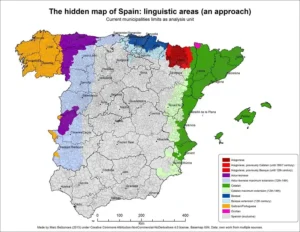We’ve already discussed the most widely spoken languages in the world, but do you actually know which are the co-official languages in Spain? Do you know all the places they’re spoken? In this article, we’ll dive deeper into Spain’s co-official languages, their histories, and some fascinating facts about them that you might not know.
A Brief History of Co-Official Languages in Spain
Before the Romans arrived, the Iberian Peninsula was inhabited by diverse groups of people: the Iberians in the eastern area, the Celtic-influenced peoples in the north, the west, and the inland part of the peninsula, and the Turdetani and Tartessians in the southwest.
Each of these groups was divided into several tribes, and some of them, especially those near the border, shared cultural and linguistic influences. On top of all that, the Greeks, Phoenicians, and Carthaginians contributed to this linguistic mosaic.
With the arrival of the Roman Empire, all the territories were unified, and Latin became the dominant language throughout the peninsula. Following the fall of the Roman Empire, various regions began to develop distinct languages that evolved from Latin over centuries. This evolution was shaped by the diverse influences of each region, including the languages of the indigenous tribes and later invasions.
Over time, some of these languages gained official recognition, while others were classified as dialects. Today, this linguistic diversity is enshrined in Spain’s Constitution, which acknowledges the co-official languages in various autonomous communities.
What Are Spain’s Co-Official Languages?
Now that we’ve reviewed some historical background, let’s focus on the present. Spain’s official language is Spanish, known as Castilian, which is used nationwide. However, in certain autonomous communities, it is co-official with the local language.
Article 3 of the Spanish Constitution declares Castilian Spanish to be the official national language of Spain and establishes that other languages are recognized as official languages in their respective autonomous communities, in accordance with their statutes.
The co-official languages in Spain, alongside Castilian Spanish, are:
- Catalan: Primarily spoken in Catalonia, but also in the Balearic Islands and Valencia (where it’s often referred to as Valencian).
- Galician: Spoken mainly in the autonomous community of Galicia in the northwest.
- Basque: The co-official language of the Basque Country and parts of Navarre.
In 2006, a fourth co-official language, Aranese, was added, which is spoken in the Aran Valley region of Catalonia.
The Rich Diversity of Co-Official Languages in Spain
Spain’s co-official languages each have unique characteristics and cultural significance:
Catalan
Catalan is spoken by more than 11 million people across various regions, making it one of the most important co-official languages in Spain. In Catalonia, it is a vital part of the region’s identity. Catalan has multiple dialects and is similar to languages spoken in the Balearic Islands and Valencia, which also recognize it as an official language. Notably, the Valencian language is considered a variant of Catalan, and both are recognized under the same linguistic umbrella.
Galician
Galician is the second-largest co-official language in Spain, with around 2.4 million speakers. It has Celtic roots and evolved from the Latin brought by the Romans, blending influences from Portuguese. Galician is not just a means of communication; it’s a crucial aspect of Galicia’s cultural identity, with a rich literary tradition.
Basque
Basque, or Euskara, is unique as it is not derived from Latin, making it a linguistic isolate. Spoken in the Basque Country and parts of Navarre, it is renowned for its complexity and variety of dialects. Euskara Batua is the standardized form taught in schools. The language is integral to Basque identity and culture, and efforts are ongoing to promote its use among younger generations.
Aranese
Aranese, a variety of Occitan, is spoken by about 2,800 people in the Aran Valley. Though small in terms of speakers, it is crucial for the cultural heritage of the region. In Catalonia, it holds the same status as Catalan and Spanish, reflecting the commitment to preserving linguistic diversity.
How Many Languages Are Spoken in Spain?
Given the information above, the quick answer to how many languages are spoken in Spain would be five. However, the reality is much richer. Let’s explore some additional facts:
- Catalan is spoken by over 11 million people in Catalonia and its variants in the Balearic Islands and the Community of Valencia.
- In Catalonia, three official languages are recognized. Since 2006, Aranese, the language of the Aran Valley in Lérida, has been co-official alongside Catalan and Spanish.
- The Valencian language is considered its own language according to the statute of autonomy of the Community of Valencia. It’s also spoken in Sierra Del Carche, in the Region of Murcia.
- Galician is the second-largest co-official language in terms of the number of speakers, emerging from the influence of various Celtic languages on Latin.
- Basque is the co-official language of the Basque Country and the Basque-speaking areas of Navarre. Euskara Batua is the standard Basque taught in schools, while many dialects, known as euskalkiak, exist as regional variations.
In addition to the official languages, there are several other languages spoken in Spain, though they are not officially recognized and are classified as dialects. These include Aragonese, Leonese, Bable or Asturian, Andalusian, Canarian, Extremaduran, and Murcian.
Celebrating Spain’s Linguistic Richness
Spain’s linguistic richness is a reflection of the country’s cultural diversity. Each co-official language carries its history, traditions, and identity, contributing to the vibrant tapestry that is Spain. This diversity enriches not only the social fabric of the nation but also its cultural heritage.
Here at Linguaserve, we proudly offer our translation services in Spain’s co-official languages, ensuring that the nuances and richness of these languages are respected and preserved. Whether for business or cultural exchange, understanding and using these languages can foster better communication and deeper connections in our increasingly interconnected world.



